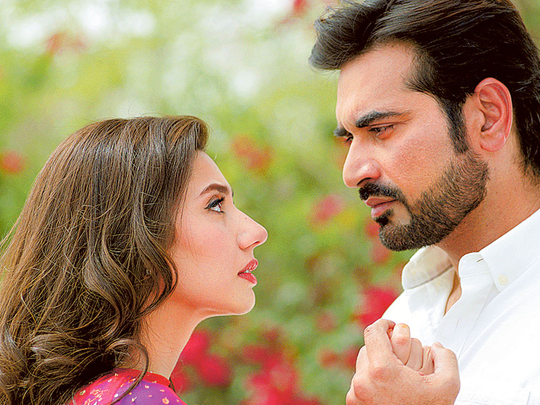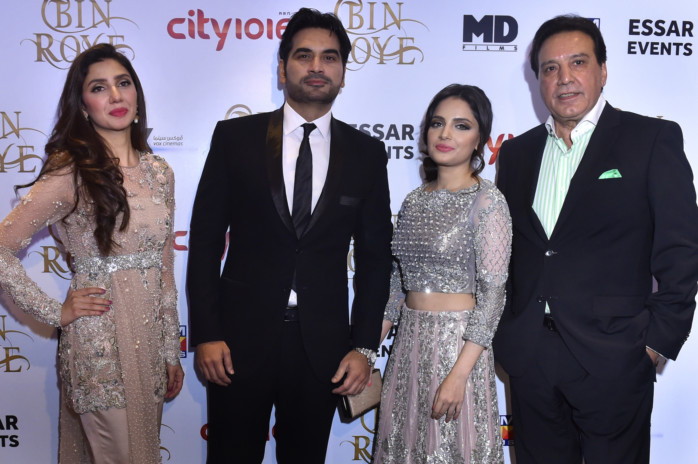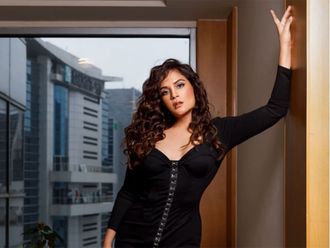
“It’s alive!” That’s how the stars of the latest Pakistani drama, Bin Roye (Without Tears), describe their country’s resurgent film industry.
“He’s come out of his sickness, he’s fought through cancer and he’s alive and well. Now we need to care for him and feed him,” says Mahira Khan, the lead actress of the drama that had its world premiere in Dubai on Wednesday night. The film releases globally this Eid.
“We need to work together, support each other, stop cutting each other out and we can go places,” adds Khan.
After years in a dry spell, thanks mostly to economics and politics, Pakistani movies are pulling in the crowds not just at home, but around the world. And Bin Roye, “a signature Pakistani film,” is riding that wave, says producer and co-director Momina Duraid. “We have stories that are rich in content, that’s always been our forte. You cannot compare us to Bollywood or Hollywood but we’ve got our own little niche, and we want to take that global,” she says.
With their nuanced portraits of life and relationships and a great knack for storytelling, Pakistani films and TV serials have recently been making waves, especially in neighbouring India where Bollywood rules. Last year, the network Zee Entertainment launched a new channel, Zindagi, in India, dedicated to content from Pakistan.
Bin Roye, a complicated story of love and loss played out between three characters, is based on a book by Farhat Ishtiaq, who’s also written the screenplay. The film was partly shot in the UAE.
Its aggressive push by distributors, here in the UAE and globally, was unanticipated for a Pakistani film. At the Eid box office, it will face-off with Bollywood superstar Salman Khan’s Bajrangi Bhaijaan.
The stars, however, are not concerned.
“This film was made long before Bajrangi Bhaijaan was announced and it will cater to a different audience, so I think we will be OK,” says Khan.
Initially intended to be TV serial, producers Hum Network decided to turn it into a feature film after releasing its potential. The series, with the same cast, will make its debut later in the year.
Both lead actors, the hugely popular Khan, and heart-throb Humayun Saeed, made their names in TV before doing films.
Saeed, often described as the Shah Rukh Khan of Lollywood, an unofficial reference to the Lahore-based industry, says he was a bit concerned before he took on the role.
“When I read the script, it was a very women-centric role and I was a bit concerned about how much I’d get to do in it. But my role was so beautifully written that I wanted to challenge myself,” he says.
Actor Javed Sheikh, who has also appeared in a few Bollywood films, says he said he said yes to the film because of the scale of the production.
“From the direction to the content and the music, it was just different. There are very few projects like this so I couldn’t say no,” he says.
For Khan, it was something she didn’t like about the script that stirred her interest.
“There was a scene that bugged me. I couldn’t wrap my head around it when I read it. But it drew me. I wanted to perform it and see what happens,” she says, without revealing the scene and adding it comes right before the interval.
“If people can come out of Bin Roye feeling even just a little bit of what this character felt, and touched your heart, that’s enough for me.”
Khan made her name with the acclaimed TV serial Humsafar, which ran from 2011 to 2012, and also starred in Bol, the 2011 film that broke records in Pakistan and created waves in India. She will soon make her Bollywood debut opposite Shah Rukh Khan, arguably India’s biggest star, in Raees, scheduled for Eid 2016.
Her casting opposite the big Khan is a recognition for Pakistani talent and the industry, she says.
“If any industry, not just Bollywood, looks at us and picks any of us out, and say, ‘This is who we want’, then yes, I think it’s a big achievement,” she says. “Because that means we have the talent and people are looking at us.”
Pakistani communities around the world need to step it up to show the world what they are capable of, says Saeed.
“We need their support to go out and watch films like this. The most people watch them, the more similar films will be made,” he says.
Producer Duraid agrees.
“I want us to reach that level where we can experiment with things. We’ve proven that we are capable of telling really good stories. Now we just need take it forward and build on this.”
“We’ve started the revival,” adds Khan. “Now we just need to keep it going.”










